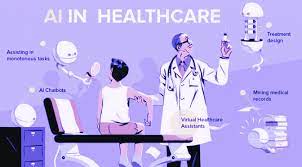As President Biden has highlighted, artificial intelligence (AI) holds tremendous promise and potential peril. This is especially true in healthcare. On October 30, the President underscored his commitment by signing a landmark Executive Order aimed at governing AI development and use to improve health outcomes for Americans while safeguarding their security and privacy.
The Biden-Harris Administration is leveraging every tool at its disposal to advance responsible AI in healthcare. However, U.S. government action alone cannot achieve the bold vision laid out by the President.
By integrating AI into their platform, Salesforce aims to empower public health organizations with actionable insights and predictive analytics. From disease surveillance to population health management, AI-driven solutions have the potential to revolutionize how we approach public health initiatives. Therefore, policy priorities include managing and measuring the environmental impacts of AI by requiring emissions disclosures, adding environmental impact as a risk factor, and establishing efficiency standards for high-risk AI systems.
In response to the Administration’s leadership, leading healthcare providers and payers have announced voluntary commitments to the safe, secure, and trustworthy use of AI in healthcare. These commitments build on ongoing efforts by the Department of Health and Human Services (HHS), the AI Executive Order, and earlier commitments from 15 leading AI companies to develop models responsibly. Today, 28 providers and payers have joined these commitments, including Allina Health, Bassett Healthcare Network, Boston Children’s Hospital, Curai Health, CVS Health, Devoted Health, Duke Health, Emory Healthcare, Endeavor Health, Fairview Health Systems, Geisinger, Hackensack Meridian, HealthFirst (Florida), Houston Methodist, John Muir Health, Keck Medicine, Main Line Health, Mass General Brigham, Medical University of South Carolina Health, Oscar, OSF HealthCare, Premera Blue Cross, Rush University System for Health, Sanford Health, Tufts Medicine, UC San Diego Health, UC Davis Health, and WellSpan Health.
The commitments align with the “FAVES” principles—Fair, Appropriate, Valid, Effective, and Safe. Under these principles, companies commit to informing users when they receive content that is largely AI-generated and not reviewed by humans. They will adhere to a risk management framework to monitor and address potential harms of AI applications.
Additionally, they pledge to develop AI solutions responsibly, advancing health equity, expanding access to care, making care affordable, improving care coordination, reducing clinician burnout, and enhancing patient experiences.
Healthcare is an essential service, and quality care can be a matter of life and death. AI-enabled tools used for clinical decisions must undergo appropriate testing, risk mitigations, and human oversight to avoid costly or dangerous errors. AI diagnoses can be biased if not trained on diverse data, and AI’s data-collection capabilities could create privacy risks. Addressing these risks is crucial.
Despite these risks, AI holds enormous potential to benefit patients, doctors, and hospital staff. AI can help doctors deliver higher-quality, more empathetic care and cut healthcare costs by hundreds of billions of dollars annually. It can also help patients make more informed health choices by better understanding their conditions and needs.
Consider some examples: Each year, hospitals produce 3.6 billion medical images worldwide. AI helps doctors analyze images more quickly and effectively, detecting signs of breast cancer, lung nodules, and other conditions earlier than ever before. AI is also streamlining drug development, matching drug targets with new molecules faster and cheaper, translating to better care for patients. Additionally, new generative AI applications can alleviate clinician burnout by automating data extraction, form population, note recording, and patient communications.
The Promise of AI in Health Outcomes
To understand AI applications and the necessary risk-mitigation measures, the Biden-Harris Administration has engaged with healthcare providers, payers, academia, civil society, and other stakeholders. These engagements have informed the Administration’s approach, including the President’s October AI Executive Order, which tasks HHS with a wide range of actions to advance safe, secure, and trustworthy AI. These actions include developing frameworks, policies, and potential regulations for responsible AI deployment, documenting AI-related safety incidents, prioritizing grants for innovation in underserved communities, and ensuring compliance with nondiscrimination laws in AI deployment in healthcare.
The private-sector commitments announced today are a critical step in our whole-of-society effort to advance AI for the health and well-being of Americans. These 28 providers and payers have stepped up, and we hope more will join these commitments in the coming weeks. The Promise of AI in Health Outcomes has been addressed by governments everywhere.
In March 2024, Salesforce strengthened its AI commitment to healthcare.
Salesforce’s Einstein 1 Platform powers Einstein Copilot with your healthcare organization’s unique data and metadata from Data Cloud to capture and summarize patient details, quickly update patient and member information, and automate manual processes
Assessment Generation digitizes paper assessments and surveys to capture and track patient data
Customers like Baptist Health South Florida and HarmonyCares are using Salesforce to personalize patient interactions and create a single, unified view of each patient
Today, Salesforce announced AI and data innovations for CRM to help make healthcare operations more efficient and personalized. Einstein Copilot: Health Actions, a conversational AI assistant that will deliver trusted AI responses grounded with your healthcare organization’s own trusted and private data, Assessment Generation, and Data Cloud for Health help automate and streamline clinical summaries, deliver more personalized communication, and help compile tailored patient assessments faster for care teams, all from a single platform.
These new innovations are powered by Salesforce’s Einstein 1 Platform, which helps organizations safely unlock their data to create better patient experiences and augment employee productivity.
Why it matters: Nearly a quarter of U.S. healthcare spending is wasted on administrative costs, presenting a potential cost savings of up to $320 billion for healthcare organizations, according to McKinsey and Co. AI could be the solution, with recent Forrester data revealing that 82% of healthcare data leaders say AI is a top focus area that will drive operational efficiency.
Content updated April 2024.









